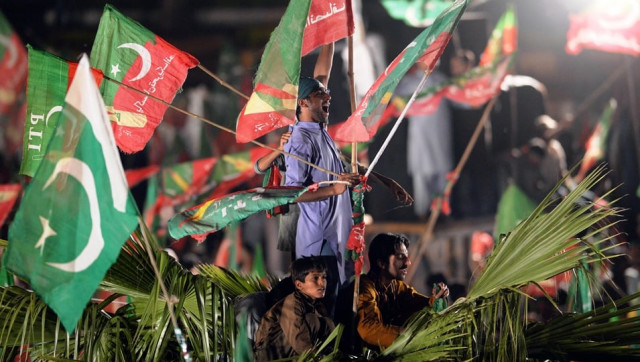K-P as a political oasis: mirage or reality?
PTI may have put up stiff opposition in the Centre and Punjab, but it is not without resistance in K-P.

Though political polarization seems to have divided Punjab, the situation in Khyber-Pakhtunkhwa appears to be far removed from the torrid wrangling.
Pakistan Tehreek-e-Insaf may have been putting up stiff opposition in the Centre and Punjab, but it is not without resistance in K-P where various parties occupy the opposition benches.
And irrespective of the opposition’s ingredients, Pakistan Muslim League-Nawaz is considered to be an active political force in the province.
Former opposition leader in the K-P Assembly, Sardar Mehtab Khan is now occupying the office of governor, besides playing his role as the ‘Constitutional Godfather’ in the province. Moreover, he is wholly and solely responsible for looking after the affairs of the Federally Administered Tribal Areas, which still serves as a buffer between the countries on either side of the Durand line.
Considered to be the ‘hub of violence, extremism and terrorism’, running the affairs of Fata is no easy task for a civilian, that too, a politician—a politician who is facing multifaceted opposition from political forces and the general public alike.
Sardar Mehtab Khan posed a threat to the PTI after he became the opposition leader following the 2013 general elections. And then Prime Minister Nawaz Sharif, perhaps taking a cue from Pakistan Peoples Party’s co-chairperson Asif Ali Zardari, assured of “respecting the mandate of others in federating units.” In tandem, he alleviated the threat by elevating Sardar Mehtab to the post of K-P governor.
One may beg to differ with the political stance of Mehtab and Chief Minister Pervez Khattak, but no one can undermine their personal merits such as decency, politeness and competence. Both have known each other since the early 80s’ when Pervez Khattak was serving as a district council vice chairman after Ziaul Haq introduced the local bodies system. Similarly, Mehtab made his entrance into the provincial assembly in the 1985 party-less polls.
After the 1988 general elections, they found each other in rival political camps inside the august house. Since then, not much has changed. Both are still opponents, albeit part of the same administrative machinery in the province. This, perhaps, has bred mutual respect, with prudence trumping political wrangling.
With the political climate being what it is in Islamabad and Lahore, the situation in K-P—even amid the hoopla of the Azadi March—is quite agreeable. The civil administration of southern districts is engaged in facilitating the displaced people of North Waziristan and summer and sports festivals are taking place in Peshawar, Dir, Chitral, Galiyat, Naran, Shugran and Kaghan.
Governor Mehtab is not only monitoring the affairs of IDPs himself, he is also busy hobnobbing with elders from the Dawar and Uthmanzai tribes to ensure durable peace and tranquility upon completion of military operation Zarb-e-Azb.
Mehtab believes the “country in general, and K-P in particular, cannot afford political confrontation at this stage”. Instead, he is focusing his energy on “mutual understanding and reconciliation”, which according to him, is essential to pull the people of the region out of extremism, intolerance, poverty and economic disarray.
Since assuming the office of governor in March last year, Mehtab has avoided indulging in political matters or controversial statements. Harbouring similar intentions is Pervez Khattak, thus paving the way for a peaceful and cordial atmosphere in an otherwise violence- and extremism-hit province. Instead of tall claims, hostile political speeches and unnecessary political criticism, Khattak prefers practical steps. This is not to say the petty accusations over issues such as load-shedding are non-existent, but these are only mere misgivings to keep the electorate on its feet.
Whatever the intentions behind the August 14 rallies and processions may be, there is no denying the prestige of this important day. All over the world, independence days are celebrated with renewed pledges of peace, stability, progress and prosperity.
Peaceful processions and rallies are everyone’s right, but all such constitutional rights must be exercised with some restraints. And while the government must deal with such protests with patience, there should be no room for confusion. Let the protesters protest; by doing so, the government can easily avert a crisis. Like former president Asif Ali Zardari, Prime Minister Mian Nawaz Sharif needs to adopt a policy of reconciliation. Both sides must be patient as the country is in dire need of peace and stability. Let the elected government complete its constitutional term; and the masses be given the right to gauge its performance.
Published in The Express Tribune, August 15th, 2014.













COMMENTS
Comments are moderated and generally will be posted if they are on-topic and not abusive.
For more information, please see our Comments FAQ